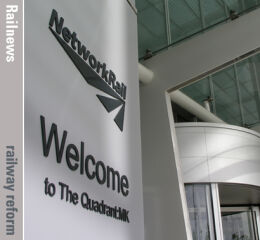Posted 3rd April 2024 | 1 Comment
Network Rail prepares for major changes as CP7 starts

Network Rail chief executive Andrew Haines is predicting that Control Period 7 will mean meeting the challenges of ‘climate change, train performance, industry revenue and reform’.
Control Period 7 began on 1 April, and this five year budget is expected to be the last for Network Rail in its present form, because NR is set to become Great British Railways within the next two or three years.
The six previous Control Periods go back to the launch of Railtrack on 1 April 1994, when it was separated from British Rail. It was then floated on the London Stock Exchange in May 1996.
The following years did not prove to be happy ones. Railtrack struggled with the runaway budget of West Coast Modernisation, while several serious accidents occurred between 1997 and 2002.
In the end, with its finances out of control, the company was placed in railway administration in October 2001 and replaced by ‘not for dividend’ Network Rail the following year. Changes to statistical rules meant that NR was officially classified as a government body in 2014.
Control Period 6 began with widespread timetable failures in May 2018. These led to the inquiry by Keith Williams, who concluded that the railway lacked integration and recommended the creation of a ‘guiding mind’.
Andrew Haines said: ‘The last five years has seen unprecedented change, not just at Network Rail, but across the world. Our railway kept essential workers and freight moving during the Covid pandemic, and of course we’re now faced with a different challenge – building passenger numbers back.
‘We are doing that through putting passengers first and getting closer to our customers.
‘We started that process right at the beginning of the period as Network Rail devolved into five regional business, themselves split into 14 routes, to better respond to, and work with, our train operating colleagues, the Welsh and Scottish Governments, combined and local authorities and funders. It put us in a strong position to respond to the enormous change that hit us with the pandemic, and gave us the flexibility to bounce back afterwards.
‘The creation of a new integrated rail body – Great British Railways – is designed to re-join track and train and aims to deliver a better, simpler, greener railway for all users. It will mark the end of Network Rail but that is something we look forward to in the interest of better serving our nations.’
Reader Comments:
Views expressed in submitted comments are that of the author, and not necessarily shared by Railnews.

H.Gillies-Smith, South Milford
Rather begs the question what was wrong with set up of British Rail in managing most importantly the infrastructure economically to a very high degree, operating the network and, though not so importantly perhaps the contruction/maintenance of rolling stock? Those of us who worked through the demise of BR then Railtrack and now Network Rail would suggest, not a lot. Just the constraints of the Treasury time after time......welcome to the future?
[What was wrong with BR was that it was nationalised. The Government of the day believed that the industry should be returned to the private sector, and nothing else mattered. In reality, a number of privatisations have failed, and so now they are being reversed -- slowly. In any case, the financial contraints meant that BR's management of infrastructure was not that good in its final years (although Railtrack was much worse). Who remembers 'maintenance holidays' on Regional Railways?--Ed.]